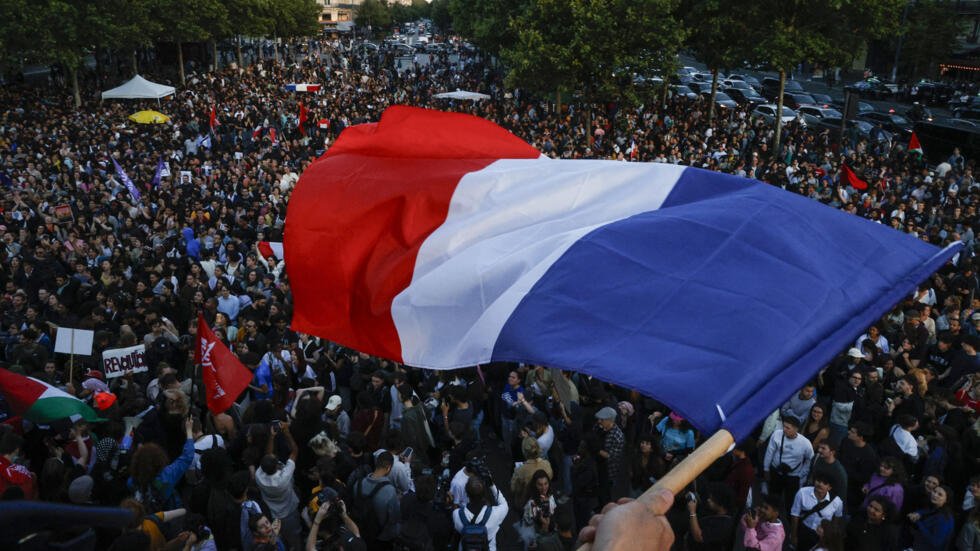French left coalition comes out on top in elections
Unexpected Outcomes in French Elections: Left-Wing Coalition Gains Ground
In a stunning turn of events following French President Emmanuel Macron’s decision to call snap elections, the political landscape in France has dramatically shifted. Contrary to earlier predictions, the far-right National Rally (RN) failed to secure a majority of parliamentary seats, as initial estimates and exit polls indicated.
With voter turnout hitting a record high of 67.1%, the highest in over four decades, early projections pointed to a strong showing for the New Popular Front (NFP), a left-wing coalition hastily formed in the wake of Macron’s announcement. This coalition, led by Jean-Luc Mélenchon, galvanized the electorate, reflecting a significant shift in the political tide.
“The will of the people must be strictly respected,” Mélenchon declared to a jubilant crowd in northern Paris. He hailed the results as a triumph for the newly minted alliance, interpreting the outcome as a decisive rejection of far-right politics. “Our people have clearly rejected the worst case scenario,” he proclaimed. “Tonight, the National Rally is far from having an absolute majority.”

As the preliminary results trickled in, the NFP emerged with the most seats, albeit falling short of the absolute majority required to govern independently. Macron’s centrist Ensemble coalition followed closely in second place, while the RN settled in third. With no party achieving a clear majority, the future governance of France remains uncertain, with final results expected early Monday.
The evening’s dramatic developments prompted Prime Minister Gabriel Attal to resign shortly after the results were announced. This move puts Macron under considerable pressure to appoint a successor from within the NFP coalition, reflecting the shifting political dynamics.

At the RN’s election base in eastern Paris, the mood was somber. Supporters watched in dismay as the initial results flashed on a giant screen. “I’m incredibly disappointed, but democracy has spoken,” said 19-year-old Joscelin Cousin, an RN supporter. “I suppose people are still afraid of the false caricature image that RN has spent years working to dispel,” he lamented. The celebratory atmosphere quickly dissipated, with untouched champagne flutes symbolizing the unexpected defeat.
Marine Le Pen, the RN’s prominent leader, was notably absent from the scene. Instead, her protégé and the party’s president, 28-year-old Jordan Bardella, delivered a subdued speech. He acknowledged the disappointing results and criticized the alliances that, in his view, had hindered the RN’s progress. “Unfortunately, alliances of dishonor tonight have deprived the French people of a policy of recovery,” Bardella stated. He vowed that the party’s struggle for power was far from over, emphasizing, “More than ever, the National Rally embodies the only alternative and will stand by the French people. We don’t want power for power’s sake, but to give it back to the French people.”
This unexpected outcome reflects the complexity and unpredictability of French politics. The high voter turnout signifies a deeply engaged electorate, unwilling to accept a far-right government. The formation and rapid rise of the NFP demonstrate a potent force in French politics, capable of challenging long-established parties and shifting the political narrative.
As France waits for the final results, the country stands at a political crossroads. The NFP’s surge represents a significant shift towards left-wing politics, challenging Macron’s centrist policies and the RN’s far-right agenda. This election has not only reshaped the parliamentary landscape but also highlighted the evolving political sentiments among French voters.
In the coming days, the political maneuvering will intensify as parties negotiate alliances and strategies to form a stable government. Macron’s next move, particularly his choice for Prime Minister, will be crucial in navigating this new political terrain. The appointment of an NFP member could mark a significant departure from his previous policies, signaling a new direction for his administration.
This election serves as a stark reminder of the dynamic and often unpredictable nature of democratic politics. It underscores the importance of voter engagement and the powerful impact of collective political will. As France moves forward, the lessons from this election will undoubtedly shape its future political discourse and governance.
The surprising results of this snap election have set the stage for a new era in French politics. The clear rejection of far-right ideologies and the embrace of a progressive, left-wing coalition signal a profound shift in the country’s political landscape. As the final results are confirmed and the new government takes shape, France stands poised at the brink of significant political transformation.
Related
Discover more from NewsPour
Subscribe to get the latest posts to your email.




Let your voice be heard! Share your thoughts and ignite discussions.